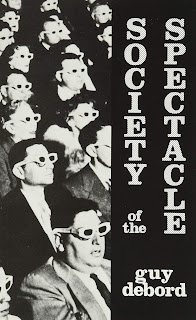I'm going to try using this site more like a traditional blog, and post the chapter summaries of books I have been reading lately. First off is Guy Debord's Society of the Spectacle, which I chose to re-read earlier this year since the question as to how well, or how poorly, it holds up in the current media and political context was a point of discussion the last time I taught Popular Culture -- in addition to which, the more general question of to what extent such late-20th century critiques remain relevant, irrelevant, or have even become more crucial than ever, seems increasingly important. Even though there are supposedly newer and better translations, I chose the old Black & Red version out of nostalgia, because this is the copy I picked up at the San Francisco Anarchist C/Nonvention in 1989.
Guy Debord, (1983 [1967]), Society of the Spectacle. Black & Red, Detroit.
Chapter 1: Separation Perfected.
In this initial chapter, Debord sets up the opposition of "separation" vs. "unification,” the former of which is the spectacle. The spectacle has no purpose or goal other than self-reproduction. It has power through the commodification of labor (i.e., as labor-time or labor-power), and the consumption of commodities. The spectacle possesses the "monopoly of appearance" and demands passive acceptance and consumption (such a view was clearly most relevant to the era of films and television).
Debord traces the ancestry or history of the spectacle from earlier forms of theology/ideology/illusion. He takes the stance that the "specialization of power" (i.e., hierarchy, authority) is "the oldest social specialization ... at the root of the spectacle" (#23); such a statement is perhaps one of the reasons Debord is more attractive to anarchist theorists than to “true” Marxists, for whom control of the means of production is most crucial, and political power is merely a reflection of this.
Debord makes observations regarding the link between spectacle and technology, relevant to the present. Concepts like "unitary view" and "direct communication" are used to describe those aspects of the social which are eroded or destroyed/supplanted by the spectacle.

No comments:
Post a Comment